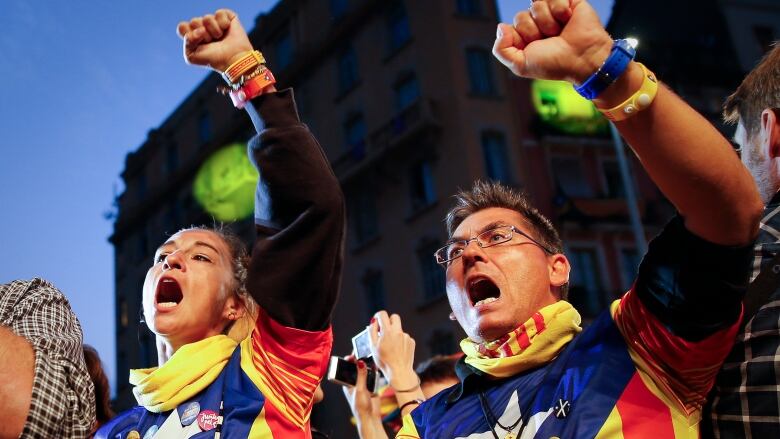Spain's Catalonia separatists win regional vote in push for independence
Secessionist campaign faces defining moment as government calls breakaway plan 'nonsense'

Separatists have won a clear majority of seats in Catalonia's parliament, preliminary official results showed on Sunday, in an election that set the region on a collision course with Spain's central government over independence
"Catalans have voted yes to independence," acting Catalan regional government head Artur Mas told supporters, with secessionist parties on track to secure 72 out of 135 seats in the powerful region of 7.5 million people that includes Barcelona.
- More than 1 million cast ballots in symbolic independence vote
- Catalonia chooses semi-autonomy in binding Spanish vote
The strong pro-independence showing dealt a blow to Spanish Prime Minister Mariano Rajoy, three months before a national election. His centre-right government, which has opposed attempts to hold a referendum on secession, has called the separatist plan "nonsense" and vowed to block it in court.
Spain's constitution does not allow any region to break away, so the prospect of an independent Catalonia remains highly hypothetical.
Financial turmoil
The main secessionist group "Junts pel Si" (Together for Yes) was on track to secure 62 seats, while the smaller leftist CUP party would get another 10, according to official results with 97 percent of the votes counted.
The separatist parties have said that this strong of a result would allow them to unilaterally declare independence within 18 months, under a plan that would see the new Catalan authorities approving their own constitution and building institutions like an army, central bank and judicial system.
Spain's banks, including some based in Barcelona, have warned secession could cause financial turmoil, while the Bank of Spain has said Catalonia could risk exiting the euro.

Addressing supporters of Junts pel Si in central Barcelona, Mas said a "democratic mandate" now existed to move forward with independence. "That gives us a great strength and strong legitimacy to keep on with this project," Mas told the exultant crowd, which chanted "in-inde-independencia" and waved secessionist flags
But many of the 5.5 million voters said on Sunday they did not believe in the idea.
Some said they had used their ballot as a way to press the Catalan and Spanish authorities to discuss a more favourable tax regime as well as laws that better protect language and culture.
Jose Luis Bonet, a 43-year-old architect, said the election was highly confusing and gave a bad image of Spain and Catalonia to the world.
Bonet, who voted for the socialist party, said he was not in favour of independence but that the Spanish state should have accepted holding a referendum on the issue.
"This election is shameful. It would have been much better to organise a vote like in Scotland with debates and proper information so that voters can make up their mind," he said.
High turnout
The two separatist parties would jointly obtain 47.8 percent of the popular vote, on a record turnout of 78 percent a big boost to an independence campaign which has been losing support over the last two years.
The vote is also set to influence the course of the Spanish general election in December.
The main national parties, all seeking to capture more votes in Spain's second most populous region, have said they are ready to discuss with Catalonia a more favourable tax regime and increased infrastructure spending if they win.

Depending on who forms a government in Madrid, constitutional reform to recognise Catalonia as a nation within the Spanish state may even be on the cards.
"Only when a final package [of reforms]is adopted and put to a vote will the problem find some form of resolution," Teneo Intelligence analyst Antonio Barroso said in a note this week.
"Even if secessionist parties are able to remain united a big if and continue pushing for independence, any concessions from Madrid would probably help to stymie the movement's momentum," he also said.












_(720p).jpg)


 OFFICIAL HD MUSIC VIDEO.jpg)
.jpg)



























































































